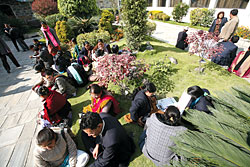 KIRAN PANDAY |
In the euphoric aftermath of the April Uprising in 2006, the formulation of an interim constitution was a hugely challenging task. The restoration of parliament was certainly historic. But while the old guard of the Nepali Congress and UML wanted to maintain the status quo, the Maoists were unlikely to be satisfied with anything less than the outright declaration of a People's Republic.
Justice Laxman Aryal, more of an organic intellectual than a constitutionalist, succeeded in finalising a 'least unacceptable document' in the absence of a political consensus over the system of governance. But he passed away in September 2009 a disillusioned man, his draft for the interim constitution mutilated almost beyond recognition.
Despite the reservations of the Maoists, the framers of the interim constitution chose to retain the parliamentary system of governance. The anomaly of that preference became apparent when the reconstituted parliament decided to keep the monarchy under suspension. Girija Prasad Koirala functioned as head of state as well as the government when ethnic eruptions threatened the constituent assembly elections. Had Koirala not been a 'constitutional dictator' in those trying times, it's unlikely the CA elections would have taken place at all.
The successful completion of the CA elections validated the concept of the politics of consultations, the fundamental premise of the interim constitution. But the Maoists challenged this principle of harmony by insisting upon the declaration of a republic at the very first meeting of the constituent assembly. The CA lived to see another day, but the seeds of discord had been sown.
Amendments in the interim constitution then created the posts of president and vice-president, to be chosen through elections. Majoritarianism became the basis of government formation. The consensual CA's transformation into a parliamentary site of political contestations was now complete.
The drafting of the new constitution by this supreme elected body has since receded into the background of intensifying political bickering, to the extent that the CA is almost defunct. The Maoists continue to obstruct its sittings and anti-Maoist forces do nothing to clear the logjam. At this rate, not many tears will be shed if the CA ceases to exist without drafting a new constitution.
The possibility of a political vacuum after May 28, 2010 has energised extremists of the left and right alike. The Maoists have begun to plan for a 'fusion' of ethnic unrest and urban uprising to capture the state. Radicals of the right insist that the president can continue to function with the residual authority of the CA even after the body that created his post ceases to exist. No matter which side prevails in this contest of radical convictions, the middle ground will disintegrate.
It's the responsibility of the government to initiate a reconciliation. But Premier Madhav Kumar Nepal is too busy preparing for his next overseas jaunt to pay attention to issues of governance. His deputies in the cabinet are political lightweights. So the ideologues of Shital Niwas have taken the opportunity to mount a frontal attack on the very essence of the parliamentary system.
In a parliamentary system, the head of state is purely ceremonial. It appears some would prefer to adopt the German model of the Weimar constitution, wherein the president was considered to be "the pivot of the constitutional scheme, as a 'neutral, mediating, regulating, and conserving' power set above all other branches to defend the constitution and maintain the state." What this ultimately led to needs no elaboration.
Parliamentary decisions are excruciatingly slow, sometimes confusing, often frustrating and almost always contestable. But like democracy itself, it is the worst form of government except for all the others that have been tried. The CA has every right to extend its term if drafting of the constitution can't be completed in time. If the president has any authority, it's purely moral. He should not be advised to think that he can exercise residual powers without inviting political uncertainty, a collapse of governance and social calamity.



